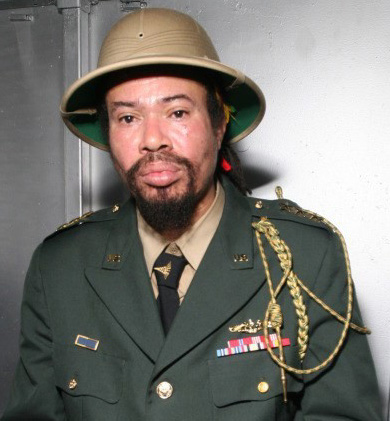BRIGADIER JERRY

Reggae toaster appreciated
by Eric Doumerc
Robert Russell, aka Brigadier Jerry, was born in Kingston, Jamaica in 1957 and became intesrested in music at an early age when he began to follow U-Roy's King Sturgav Hi Fi. In the 1970's, he became a member of the Twelve Tribes of Israel, a Rastafarian organisation which was making many converts at the time and began to toast on their Jah Love sound system. He then became friends with singers Fred Locks and Freddie McGregor, who were both members of the organisation.
Russell recorded three songs for Studio One before having a hit in 1982 with "Pain," a version of Slim Smith's "Never Let Go" and then "Gwaan a School," released on the Jwyanza. label. Brigadier Jerry began to work with various sound systems like Black Star and Surpeme Love, and even with the Downbeat International sound system which was based in the USA. He gradually acquired a solid reputation as a conscious deeajay thanks to the ubiquitous sound tapes which were cropping up in expatriate Jamaican communties in Britain and the USA. These tapes turned him into a folk hero in these communties.
In 1983, an album entitled Brigadier Jerry At the Controls was released on the Vista Sound label and made it possible for reggae fans to get an idea of Brigadier Jerry's skills at the mike. The album was recorded live in Ocho Rios at a dance where Jerry was the main deejay on Jack Ruby's sound system. Thus we get Jerry's versions of Dennis Brown's "The World Is Troubled" and "To the Foundation" as well as his toast on Sammy Dread's massive hit "Dreadlocks Child." Jerry even incorporated a few lines from Elvis Presley's "In the Ghetto" into his toast. We also get to hear Jerry's version of Michael Prophet 1980 hit "Gunman."
In 1985, Brigadier Jerry's first studio album, Jamaica Jamaica, was released on the RAS label and contained a very good version of Bunny Wailer's "Armagideon" as well as an astounding autobiographical title-track, which was a kind of love letter addressed to his home island. That album also featured Jerry's take on the "Three Blind Mice" riddim, once popularised by Max Romeo.
1985 also saw the release of a one-riddim album entitled Stalag 17, 18 and 19 which gathered several versions of Winston Riley's seminal "Stalag 17" riddim. That riddim is particularly famous for propelling the singjay Tenor Saw to fame with his hit "Ring the Alarm." Jerry's version, entitled "What Kind of World," bemoaned the state Jamaica was in twenty years after Independence and took Jamaican politicians to task for letting the people down, hence the title of the song. That track proved that the new dancehall style was not incompatible with socially or politically conscious lyrics.
In the late 1980's, Jerry moved to the USA and between 1988 and 1991, he lived in New York, releasing an album entitled On The Road in 1991. 1993 saw the release of the Tapper Zukie-produced Hail Him, an album that contained a modern version of an old reggae track entitled "Heart Don't Leap" by Dennis Walks and I-Roy. The new version was entitled "Mr Talkative" and featured Dennis Brown on vocals. Another reggae classic given the Brigadier Jerry treatment was "Bangarang," originally by Lester Sterlng and Stranger Cole. The original chorus, "Woman no want bangarang" became in the new version "Rastaman no want no bangarang." U-Roy's influence could still be discerned on tracks like "Jah A the GODfather," but his version of Beres Hammond's "Putting Up Resistance" clearly showed that Jerry had devedeloped his own style. There was even a version of Errol Dunkley's "You Never Know," entitled "Ill Be Back," and a stunning rendering of the Melodians' "Everybody's Bawling," which was given rise by a wonderful toast by U-Roy.
In the 1990's, Brigadier Jerry toured a lot with the Jah Love sound system and became a source of inspiration for the new recording artists like Tony Rebel and Garnett Silk who were leading the Rasta rennaissance at the time. In 1995, Jerry released a new album entitled Freedom Street, which featured tracks like "Drifter '79 Style" (based on the "drifter riddim"), "Roots Man Skank," "Strictly Rub a Dub" andt "One Man Ranch."
Brigadier Jerry's influence on a whole generation of conscious artists like Tony Rebel, Garnett Silk and Sizzla cannot be overestimated and he even contributed to nurturing the career of women deejays like Sister Nancy, his sister, and Sister Carol, who later migrated to the USA.
Together with deejays like Charlie Chaplin and Josey Wales, who worked with him on the King Sturgav sound system, he rejuvenated the art of the deejay and showed that the new dancehall style could perfectly work with serious or socially conscious lyrics.